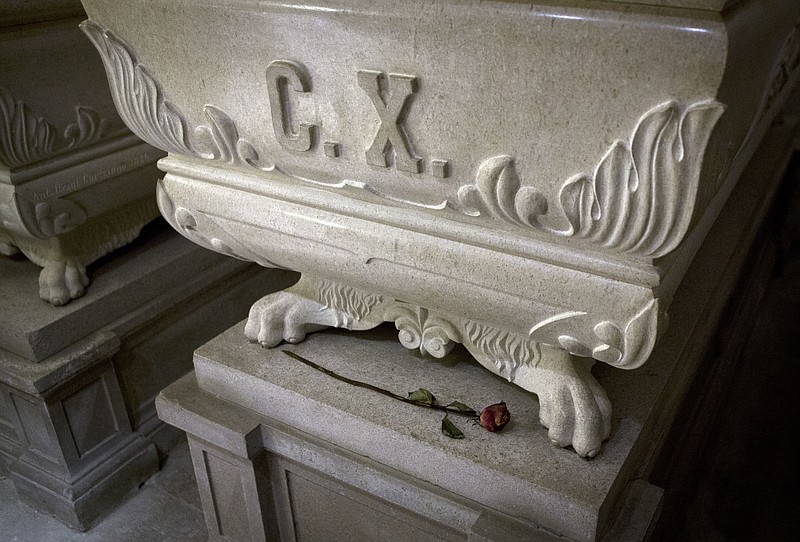NOVA GORICA, Slovenia (AP) - Beneath a small monastery in Slovenia, six marble sarcophagi flank a crucifix engraved with a French royalist coat-of-arms.
The stone crypt - 1,256 kilometers (780 miles) - from Paris holds the remains of the last Bourbon king of France, Charles X, and several members of his family. Their tomb has earned the Kostanjevica Franciscan monastery the nickname of "Little Saint-Denis" after the medieval church outside Paris where centuries of French monarchs were laid to rest.
The only French king buried outside France, Charles X was interred here 180 years ago, not long after he lost the throne to a revolution. But some historians and royalists in France are lobbying to have his remains reburied back home.
"It wasn't his choice," said Philippe Delorme, a historian behind the repatriation campaign. "Had he been able to choose, he would have died in France."
The Rev. Jernej Kurincic, abbot of the Kostanjevica monastery, said the request to move the remains came as a surprise.
"It has passed almost 200 year since then, and this is a bit incredible," Kurincic said.
Charles X was forced to abdicate and left France with his family in 1830, after the July Revolution. The royals sought exile in several places before settling in Gorizia, then part of the Austro-Hungarian empire.
The family enjoyed the hospitality of the area's Count Coronini, whose palace now lies across the border in Italy. The room where Charles X died of cholera in 1836 has been preserved in the Coronini palace.
Locals say it was the exiled king's dying wish to be buried at the Kostanjevica monastery, which he could see nestled among the greenery on the hill from his palace room.
Delorme, however, insists Charles X would prefer spending eternity alongside his two brothers and other family members at the Basilica of Saint-Denis.
"His aunts, his uncles, his cousins and so on, they are all there," Delorme said. "That's of course where he would want to be."
Delorme's group also is campaigning for the repatriation of the remains of the duke and duchess of Angouleme - Charles X's son, Louis XIX, and his wife Marie-Therese, who was the daughter of King Louis XVI and Marie Antoinette.
The remaining three royals - Charles X's grandchildren, the Count of Chambord Henri V and the Duchess of Parma Louise Marie Therese, and the count's wife, Austro-Hungarian Archduchess Maria Theresa - are not on the list because they had vowed never to return to a French republic.
So far, there's been no official request from the French government to move the royal remains. Delorme said he plans to seek government support after meeting Thursday with the Slovenian ambassador in France.
In Slovenia, the Tombs of the Bourbons have helped put Nova Gorica, a small town near the border with Italy, on the European tourist map. The town's mayor opposes the idea of relocating the royals.
"I think that we need to respect the personal wish of the last (Bourbon) French king," Mayor Matej Arcon said. "King Charles X wished to be buried in the Franciscan monastery in Kostanjevica, and let it be that way."
Delorme said a compromise solution would be for the remains of the king, his son and his daughter-in-law to go to France, while their hearts - removed, embalmed and buried next to the body under 19th century burial customs - remain in Slovenia.
Delorme cited the examples of Montenegrin, Russian and Serbian royals whose remains were reburied in their home countries. He said the wishes of Charles X's descendants - some of whom have signed the petition to return the remains - should also be taken into account.
"The return of Charles X's remains could happen fairly quickly, but this is about political willingness," he said. "Legally, I think, this wouldn't be a problem."
But, he added, "This is a diplomatic problem. It's on foreign soil."
__
Macpherson reported from Paris. Associated Press journalists Oleg Cetinic in Paris and Jovana Gec in Belgrade, Serbia, also contributed to this report.
